Matthew Collins | Being diagnosed with cancer was devastating, but the vaccine gave me hope
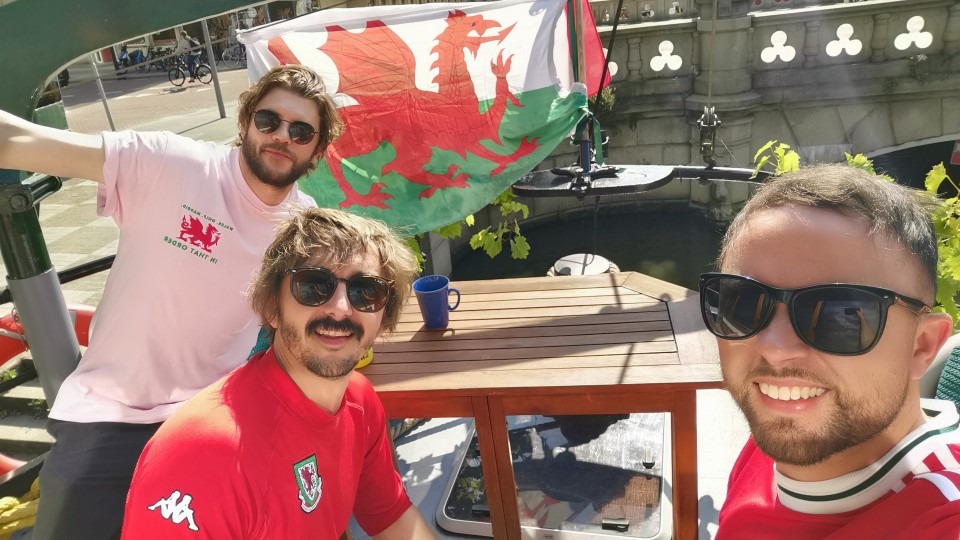
In early October, Swansea City supporter Matthew Collins had an operation on a brain tumour and a few weeks later, he was given the devastating news that - even with the best treatment the NHS could offer - he likely only had months to live.
But hope came in the form of an immunotherapy vaccine called DcVax-L.
DcVax-L has been shown to double life expectancy for people like Matthew, and increase a prognosis from months to years. However, the vaccine is yet to be approved by the NHS and, as a result, a full course of the vaccine will set a patient back £250,000.
“Obviously, I can’t afford quarter-of-a-million quid, most normal people can’t,” Matthew says of the astronomical cost of trying to extend his life.
And that is what has driven the typically shy and self-proclaimed introvert to share his story via a GoFundMe page.
“I'm having to do this publicly,” he wrote in his first post in November. “If I don't die of shame and embarrassment [that comes with sharing his story] in the meantime, I certainly will of the brain cancer.”
However uncomfortable it was to share, Matthew’s story has captured the hearts of the football-watching public in Wales.
Most people reading this are probably already aware of Matthew, whether that be through the Swans’ social media, the FAW’s promotion for the Euro 2024 qualifier against Turkey, or a video of Elis James, in which the comedian and broadcaster shone a spotlight on Matthew’s cancer journey.
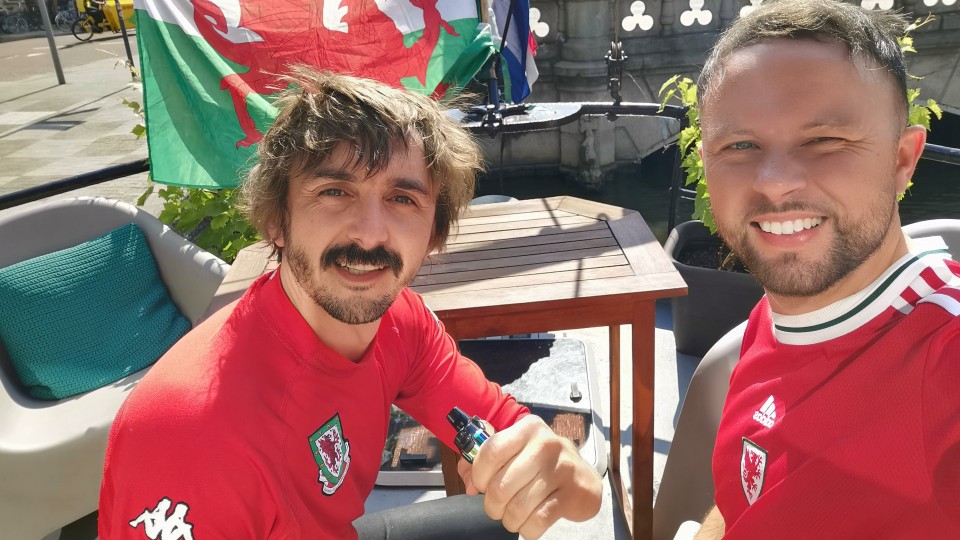
Matthew has an aggressive form of brain cancer called Glioblastoma which, even with an all-consuming course of radiotherapy and chemotherapy, has a prognosis of around 12 to 18 months.
On August 5, while watching the Swans open their 2023-24 campaign with a draw against Birmingham City, he became ill in the stands at the Swansea.com Stadium and was taken to hospital.
It was one of a series of similar hospital visits for the 36-year-old, who had started having unexplained seizures a month earlier.
Constant tests had been unable to determine a cause until things took a turn for the worse in mid-August when Matthew suffered a stroke while at a music festival.
“I started having seizures and headaches in July and I was in hospital for three or four days,” he explains.
“I was discharged, but about a month later I was at the Green Man festival and I had a stroke, which left the left side of my body completely paralysed.
“I spent about a month in hospital but then, after two weeks back at home, I noticed my headaches were getting worse.
“I went back into hospital and they did another scan, and that’s when they found the brain tumour.
“That was the end of September, and then I had the operation on October 6 to remove it. It was a few weeks after the operation when I actually found out what the diagnosis was.
“They’d said to hope for the best, but prepare for the worst. It turned out to be the worst.”
Matthew was in the middle of changing jobs when he fell ill. He’d given up his communications role in Birmingham for a new challenge at Barnardo’s Children’s charity, based in south Wales.
He was moving home and was ready to support his beloved Swans and follow the Wales men’s national team across Europe with his friends.
Two months later, he was sat down in a cold, clinical hospital room being informed he had a type of brain cancer with no cure.
Without treatment, his life expectancy would be three months, with aggressive treatment he has a less than 10 per cent chance of blowing out the candles on his 40th birthday cake.
“My dad took me to the hospital and they were doing all these checks: checking my heart rate and breathing,” he continues.
“They told me I had a brain tumour, and I was lucky I was sat down because my legs just went to jelly.
“Ever since the diagnosis, I’ve been back and forth to Velindre for cancer therapy. I had 30 sessions of radiotherapy and I had chemotherapy, which is in tablet form so I take that at home before bed.
“I’ve finished that now, but I’m resuming chemotherapy next week. That’ll be six months of treatment, one-week on and then three weeks off because it wreaks havoc with your body.”
But there is hope.
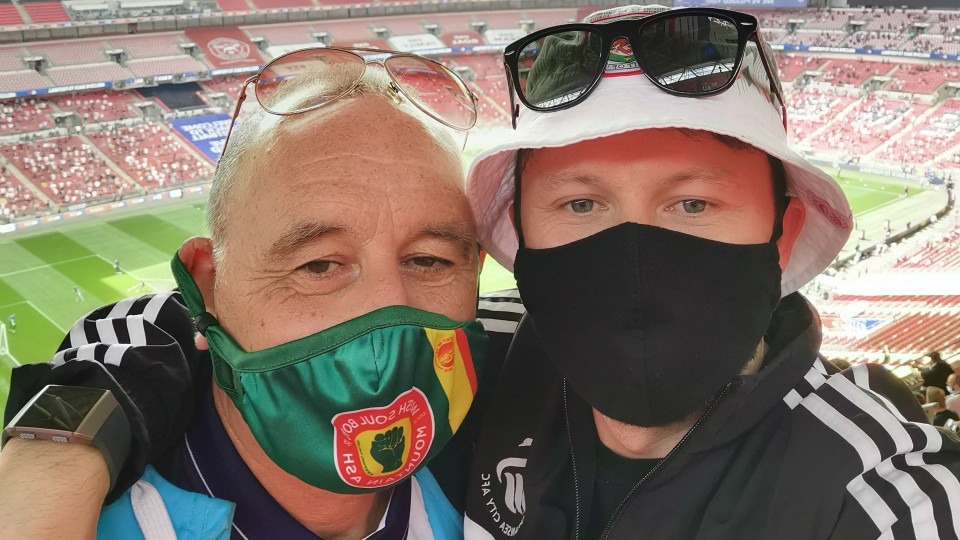
After the operation, while recuperating at home, Matthew began researching his options and found a new treatment which has been shown to extend the life of a person with Glioblastoma by years.
The NHS were doing all they could within the parameters of approved brain tumour treatments, but Matthew explains that medical advancement in this area has been slow, with little having changed in the past three decades.
“I found the vaccine through my own research,” he adds.
“Initially, it was just ‘you’ve got a brain tumour and we need to take it out’ and that was all I was focused on, but after that I was just doing my own research into it.
“The vaccine is quite new, so it hasn’t been approved for use on the NHS yet, and I don’t know how long that will take.
“Because it’s not been approved, they didn’t mention it. Obviously, they recommend the treatments that have been approved, but there hasn’t really been any development in about 30 years for brain tumours, so this vaccine is the biggest breakthrough they’ve had in a generation.
“It’s not guaranteed of course, but it can add years to your life.
“It’s really expensive, about £250,000 for treatment. Obviously, I can’t afford that, most people can’t.
“But I’ve had more than 7,000 donations on that GoFundMe page now and that’s mind blowing. I can’t believe how supportive everyone has been. I’ve raised over half of my target so that’s gone really well.
“I’m starting the vaccine next month – thanks to the donations.
“I have to travel to London and it takes four to six weeks to develop the vaccine. They take a bit of my tumour and my white blood cells, and then they engineer it in a lab which trains my cells to attack it.”
Fundraising is going well, thanks in no small part to the Welsh football family. The Football Association of Wales included Matthew on a pre-match graphic shortly after his story garnered international attention, and highlighted the GoFundMe page at the men’s home match against Turkey.
But it was really the support of comedian, presenter and devoted football fan James which brought the campaign to the forefront and helped raise thousands virtually overnight.
“I just love Elis,” smiles Matthew.
“I don’t know how he got involved. My mate actually interviewed him about the history of the bucket hat, and so I had a message from Elis the night before my operation wishing me well.
“And it just spiralled from there. He found out about my diagnosis, and then I was on the way back from Velindre one day and suddenly I was getting loads of messages from people saying ‘your fundraiser is going through the roof’'.
“He had put a video on his social media talking about it and – just from that one video – I had about £40,000 worth of donations. Without him, I’d be stuffed – I’d be nowhere near the funds I’ve got.
“I think he mentioned it on his radio show too – he’s been unbelievable. Obviously, he’s a massive Swans fan as well so I think maybe it struck a chord with him somehow.
“He said my story has really resonated with him, and he just wants to try to help. He’s obviously got a big platform for football fans in Wales and so a lot of the donations have come off the back of him.”
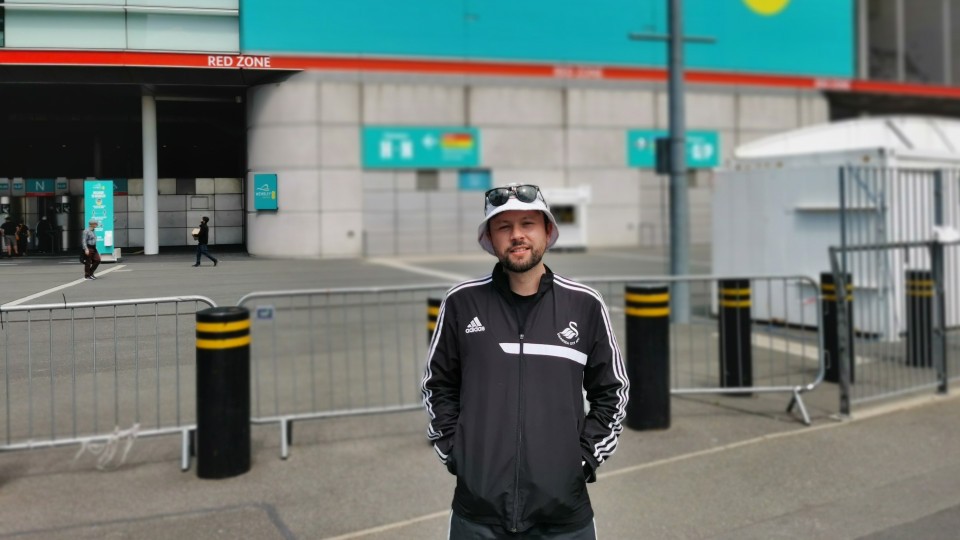
With each vaccine dose costing around £25,000, the money donated so far means Matthew could be set to begin his treatment as early as next month.
And, while that fills him with optimism of what may be to come, it does not take away from what has been a very challenging road so far.
“I feel tired most of the time,” he says, trying to explain a typical day.
“Having radiotherapy on your brain is a tiring process – I think it’s tiring anywhere but especially when it’s in your head.
“You have to go every day. I’m not allowed to drive because I’ve had brain surgery, so my parents have been ferrying me back and forth to Cardiff for treatment.
“It causes a lot of inflammation too, so I’m on a lot of medication to control that such as steroids, but that makes me balloon and none of my clothes fit me.
“I’m still able to get up and about most of the time, but some days are harder than others.
“There are some days where getting up the stairs can be a challenge. It varies from day to day, but I’m trying to stay hopeful and the vaccine is giving me some positivity.
“My friends and family have been unbelievable. I’d have fallen to pieces without their support. Some days, I think that I can do things by myself, but then the next day I need all the support.”
As well as the invaluable support of his friends, his family, strangers who’ve been moved by his story and James, Matthew explains that the Maggie’s Centre in Cardiff – which is located in the grounds of specialist cancer hospital Velindre – has been a real source of comfort too.
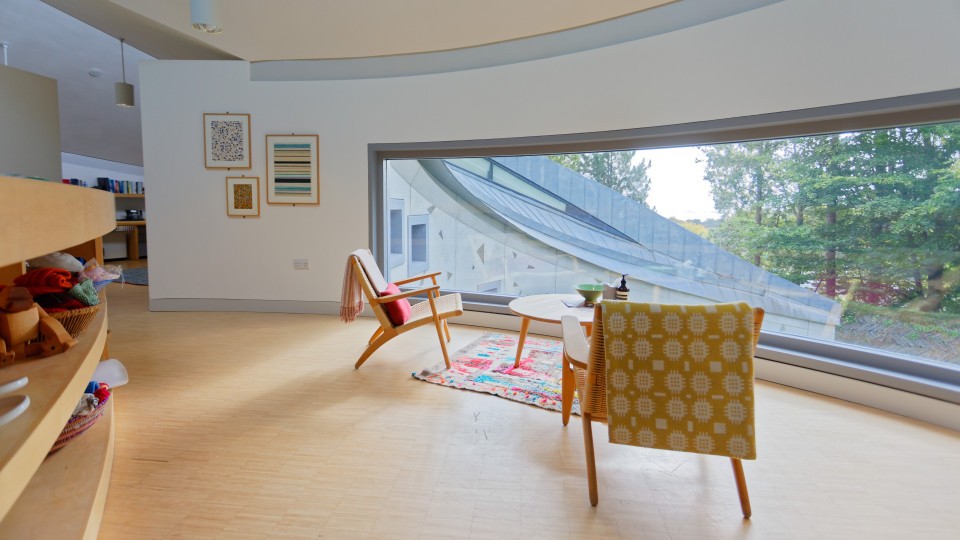
Maggie’s centres across the UK follow the same set of guidelines and offer the same homely comforts when you step through the door.
It is physically meters, but emotionally miles, from the hospital setting which can feel so terrifying, frenzied and sterile during a cancer journey.
“I think it’s incredible that the club has chosen to partner with Maggie’s,” says Matthew of the 'Tackling Cancer Together' campaign between Swansea City and the cancer support charity.
“There’s a centre near Velindre in Cardiff and I found them to be absolutely incredible. It’s on the hospital grounds, but it’s so peaceful and tranquil in there.
“Everyone is so caring and gentle. It’s like you’ve got the whirlwind of the hospital and then the retreat of Maggie’s.
“There’s lot of support for health and wellbeing, and then they tell you about the financial support because I’ve had to give up work.
“It costs a lot of money to run the service that Maggie’s provide, and having the backing of the Swans is probably massive for them. Being associated with Maggie’s is good for the Swans because they’ve always been a community club.
“It’s just incredible that they’ve come together to support each other. I think when you look at the kits and you see a charity, that’s really nice. It’s really positive and the Swans have always had that relationship with the community.”